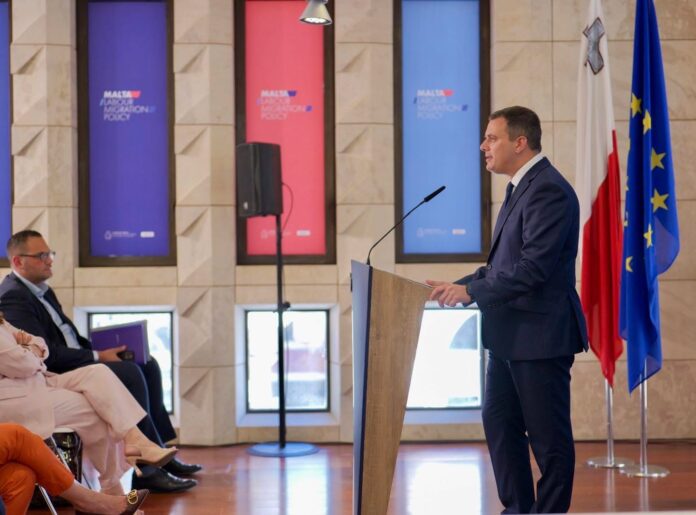VALLETTA (MALTA) (MNA/ITALPRESS) – Malta is set to implement the first phase of its Labour Migration Policy on August 1, with 12 out of 20 proposed measures entering into force. The policy, introduced by the Ministry for Work in January for public consultation, aims to modernise the framework governing the employment of third-country nationals (TCNs) and align it with Malta’s evolving economic landscape.
Minister for Home Affairs, Security, Reforms and Equality Byron Camilleri emphasised the policy’s alignment with four key principles: labour market stability, protection of workers’ rights, stronger regulatory controls, and strategic investment in skills.
“The economy we have today is not the same as when unemployment was the biggest concern,” Camilleri noted. “Today, new challenges must be addressed with decisions that reflect the government’s duty to provide clear direction and stability for the country”.
During the consultation process, which extended beyond the legal requirement to encourage deeper engagement, the policy received widespread support from both social partners and the public, according to Camilleri. Among the major reforms taking effect this August are enhanced oversight on employee termination rates and stricter job advertisement requirements for employers. Maltese companies must now post job openings on both local and EU employment platforms before hiring TCNs. Additionally, firms that have previously dismissed workers without a valid reason will be restricted from filling the same roles with foreign nationals.
Employers are also required to file employment and termination documentation promptly. Companies that fail to comply with the Persons with Disability (Employment) Act will no longer be eligible to hire TCNs. In an effort to curb abuse and attract skilled talent, the government is adjusting financial and procedural requirements for foreign workers. Application fees for new TCN workers will double in most sectors, with exemptions granted to essential fields such as healthcare and elderly care.
Meanwhile, salary thresholds will increase to Ç45,000 under the Key Employment Initiative and Ç30,000 under the Single Employment Initiative. TCNs who lose their jobs will benefit from extended grace periods to remain in the country and seek alternative employment, with preference given to individuals already residing in Malta. Further measures to be enacted include tighter visa conversion rules, more robust permit renewal checks, and a cap linking TCN hiring permissions to a company’s existing workforce size.
Certain exemptions will apply: individuals in stable relationships with Maltese citizens or parents of Maltese children under 23 will bypass the Single Permit process, though they will still need a work licence. The remaining eight measures in the policy will be phased in over the coming months, with the next batch scheduled for October 1. These will include mandatory electronic salary payments, temporary permits for visa-exempt nationals who apply within 60 days of arrival, and fee exemptions for human trafficking victims.
– Photo DOI –
(ITALPRESS)
















